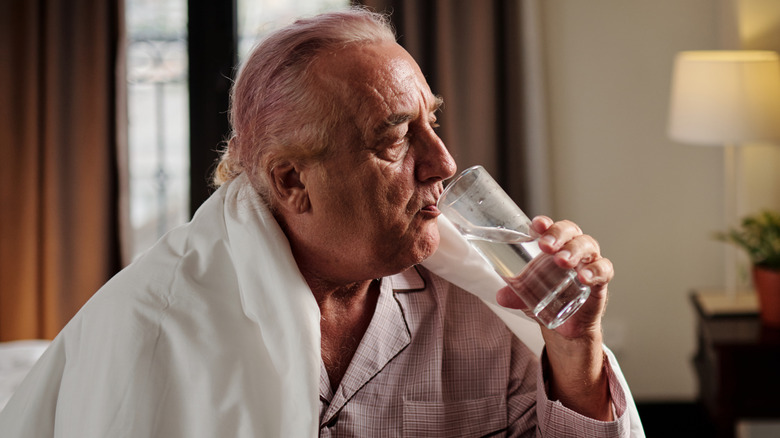What happens when a virus invades our body? According to research published in “What You Need to Know About Infectious Disease” by the National Academies Press, we fall ill when a virus either damages or disrupts the normal functioning of our cells.
How does our body react? Our immune system deploys white blood cells and antibodies to combat the virus. Additionally, our body might trigger a fever to deactivate the virus. Although the fatigue, headache, and other symptoms we experience when sick are unpleasant, they are all part of our body’s effort to eradicate the infection and maintain our health and safety.
While eating might be the last thing you want to do when suffering from a cold or fever, it’s crucial to provide your body with the nourishment it requires. This is because when we’re ill, our metabolism speeds up, causing us to burn calories at an increased rate, as noted by Scientific American.
Our body needs more calories when sick

For each degree your body temperature rises during illness, your body expends more energy (as reported by Scientific American). Although you might not feel like eating when unwell, research indicates that providing your body with food helps it better combat infection. This was demonstrated in a series of rodent studies led by Michigan State University nutritional immunology professor Elizabeth Gardner. In a 2005 study published in The Journals of Gerontology, the Michigan State University study team found that 22-month-old mice on a calorie-restricted diet exposed to the flu virus were less likely to survive the infection compared to mice with unrestricted food access. A calorie-restricted diet also correlated with increased viral concentration and reduced activity of natural killer cells in the animals’ lungs. A subsequent 2008 study in The Journal of Nutrition revealed similar results for younger mice aged six months.
“Our research shows that having a body ready to fight a virus will lead to a faster recovery and less-severe effects than if it is calorically restricted,” Gardner told MSU Today. “Adults can calorically restrict their diet eight months out of the year, but during the four months of flu season, they need to increase it to be prepared. You need reserves so your body is ready for any additional stress, including fighting a virus.”
Don’t forget to stay hydrated too

Whether dealing with a fever or a cold, maintaining our caloric intake is essential. However, this doesn’t mean you should eat until you’re uncomfortably full, especially if you have nausea or a stomachache. Instead, eating when you can is sufficient. Choosing nutrient-rich foods is advisable to combat illness, as opposed to foods high in saturated fat that can disrupt our body’s microbiome (as reported by CNN).
Chicken soup, with its vegetables, electrolytes, protein, and nasal-clearing spices, can be an excellent meal choice when you’re sick. Its broth also provides vital fluid, which is critical when ill. Just like with food, you don’t need to overdo your liquid intake. Instead, adhere to the recommended eight glasses of water daily and increase your intake only moderately when sick. For hydration, water is the best option, as alcohol or caffeine can dehydrate the body (via Scientific American).




